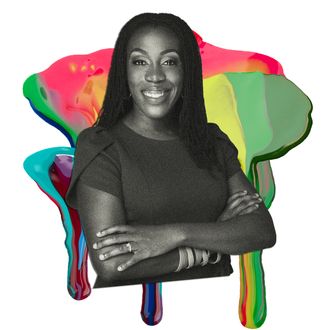
Before she became a best-selling author, financial educator, and multimillionaire, Tiffany Aliche, known as “the Budgetnista,” was a preschool teacher with $85,000 in debt. She lost that teaching job in the 2008 recession and ended up crashing on her sister’s couch for almost two years. During that time, she started offering financial-education classes, sharing the tactics she learned as she dug herself out of debt and rebuilt her life.
People connected with Aliche’s experiences and real-talk advice, so to meet the growing demand for her courses, she recorded them and put them online — where they blossomed into a $10 million business. But her success hasn’t always come easily. Aliche found herself completely burnt out by 2020, and the next year, personal tragedy struck. She got through it with the help of her team — which includes a business coach, a therapist, and her family — and by making sure she takes a walk and a nap every day.
In addition to offering online courses for personal financial planning, Aliche has an award-winning podcast, Brown Ambition, and a Netflix documentary, Get Smart With Money. She has a new book out, Made Whole: The Practical Guide to Reaching Your Financial Goals, which offers step-by-step instructions for getting on top of your money. Aliche also recently partnered with a New Jersey assemblywoman to pass a law mandating that financial education be integrated into all middle schools in the state, where she lives. Here’s how she gets it done.
On her morning routine:
I wake up naturally between 6 a.m. and 8 a.m., but I try to stay in bed until 7 a.m. at least. When I do get up, I stretch and then grab my Apple Watch and my headphones and go for a walk. My walking outfit — North Face zip-up hoodie, tights, and sneakers — is right by the door so I don’t have to make any decisions. I’ll walk anywhere from 45 minutes to two and a half hours if I have the time, usually between three to five miles per day. While I’m walking, I’ll listen to a book on Audible or a podcast, or I’ll call a friend and catch up. I typically get home by 9:30 a.m.
I like to start my workday by 10 a.m., which gives me enough time to shower beforehand and chat with my sister Tracy, who lives with me. She is also my publicist and runs her own business. We’ll cross paths in the “cafeteria,” which is the kitchen, and have some sister talk, or business talk, or both. She’ll say, “Don’t forget you have that interview today.” And I’ll be like, “Do I have to look cute, or is it just audio?” Then we’ll split and go to our respective home offices.
On living and working with her sisters:
I bought this house in 2017 and it’s five bedrooms. I was able to pay for it in cash, so there’s no mortgage and the carrying costs are low. In 2018, Tracy wanted to transition out of the company where she had worked for 15 years, but she was worried about what that meant for her financially. When I was at my brokest, she let me stay with her, rent free on her couch, for over a year. I was happy to return the favor.
When Tracy moved in, my husband was still alive. He and I renovated this house together. Every doorknob, every paint color is a memory, which is beautiful. But sometimes it can be a lot. Tracy had been talking about moving out because her business was doing well. But then my husband passed suddenly in 2021 and she stayed. It’s a blessing that she’s been here, because otherwise I would’ve been in this big house by myself.
Recently, I bought a really nice condo that’s a few blocks away. My other sister, Carol, is going to move in with her two children. I also hired her to work with me. It feels so magical to create this sort of family compound. The purpose of money is to be able to give people I care about the opportunity to expand and grow, without worrying about where they’re going to live and how they’re going to eat. That wouldn’t work for a lot of families, but it does for us.
On recovering from burnout:
I used to think I always had to be busy and I had no boundaries. When we hit our first eight-figure year, in 2020, I was in my worst emotional and physical shape ever. My blood pressure was high and I was up 30 pounds. I felt like I was losing control. Losing my husband also taught me that work is not everything. So I hired a business coach and I got a therapist.
My business coach taught me how to delegate and let people do their jobs. I was doing everybody’s else’s job because I didn’t want to bother people. Like, “Well, I know Logan has her mom in town, so I don’t want to ask her about this and I’ll just do it myself.” But I had to realize, “Logan is here. She enjoys being here. This is her job. You pay her well; you can let her do it.” And everybody adjusted. It was much easier than I thought.
My therapist taught me how to set boundaries. She had me do an exercise where I wrote down what the perfect day would look like. It’s the reason why my day is now structured the way it is. I start work at 10 a.m. and I end at 3 p.m. I didn’t plan it out hour by hour because that felt too strict — I like a lot of flexibility within structure. So I wrote down a list of ten to 15 things that a perfect day would include: a walk, a nap, a phone conversation with someone I care about, eating something that tastes good but is also good for me. I review that list every evening. It helps me focus on the good things that did happen, not, “We didn’t hit our income goal for that project.”
On what she does after finishing work at 3 p.m.:
I return to being myself instead of being the face of my company. If it’s the summer or spring, I might go for a second walk or sit in the park. I’ll hang out with a friend. I take a nap almost every day. I’m the queen of going to Whole Foods just to pick up a bag of grapes. I’ll eat dinner with my sister Tracy, or sometimes my sister Carol and the kids will come over. In the evening I’ll read or scroll on social media. My feed is almost entirely house renovations, comedy skits, and cute cats and dogs. I’ve muted almost all the financial channels and people.
On writing books in addition to running her business:
When I set out to write my first book, The One Week Budget, which I self-published in 2011, I was like, “I’m a decent enough writer, but I don’t know how to write a book.” I decided to write it like a lesson plan, because I was a schoolteacher. Since then, every book, every podcast, every blog post starts with the lesson plan. It’s a very simple structure — plan, do, review. Here’s what you’re going to learn, here are the steps to learn it, now let’s go over what you learned. All of my writing follows that template.
On becoming wealthy:
I don’t have a problem with lifestyle creep. I do suffer from post-traumatic broke syndrome — I was broke for so long, and it was so hard, that I’m afraid of going back there. I was a preschool teacher for many years, almost as long as I’ve been the Budgetnista. It can be hard to reconcile those two lives, because I still see myself as Miss Tiffany who’s like, “Don’t put the crayon in your mouth.”
I have a high-net-worth financial advisor, and she’s like, “Tiffany, you’re literally spending half of what you could spend.” I save and invest because that’s what I know and that’s what got me here. And she’s like, “Girl, don’t put any more money into the market. You hit your limit for the year. Go enjoy yourself.” I’m trying. In the last year or two, I started flying first class. I mostly use points, but still. Now I’m renovating my new condo. I can afford to get the fancy-schmancy, high-end marble countertop.
Part of me is grateful I don’t have to think about what I can afford. There’s also some fear that I’m not as connected and relatable to my audience. I used to be like, “Oh girl, I know exactly how you feel.” And now I’m like, “I think I remember how that felt.” People know that I’m wealthy. I’m candid about where I am now. So I think about this a lot: What should my new role be going forward? I want to serve my audience in a way that’s honest.
On her “boring” financial strategy:
The secret to growing wealth is that it should be boring. There’s this whole notion that if you just do this one big thing and make a million dollars this year, you’ll be set. But that’s not likely. Even if you do get lucky, you start chasing that feeling and squander what you had. Wealth and financial security is all about slow and steady wins the race. You need to have some sort of income, you have to live below that income, you have to save some of it for security and then invest the rest. That’s it — rinse and repeat. The more you make, the more you can set aside.
On retiring early:
The amount of money that I have invested, I could live off the interest that the principal generates. That’s the ideal. So could I retire now? Absolutely. But I’m only 44, so I want to keep working. I like to say I’m transitioning from being Jay-Z to being Shawn Carter. The performer onstage, that’s Jay-Z. And then Shawn Carter, he’s the businessperson running things quietly who you don’t see in front of a crowd. I’m trying to be less the face of the brand and more behind the scenes.
This interview has been edited and condensed for length and clarity.





